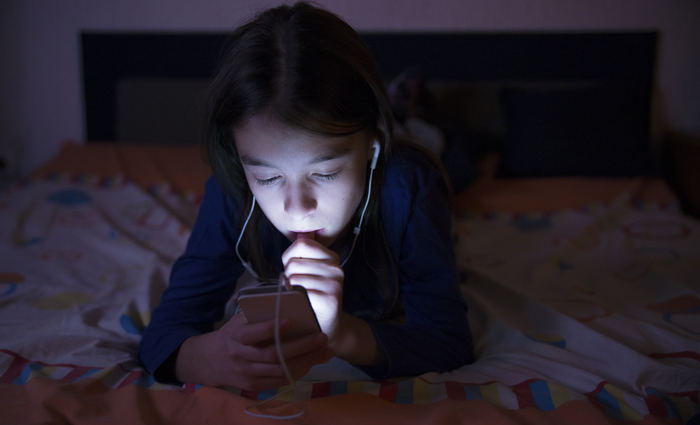The digital world has a huge amount of positive potential for our children, from encouraging creativity to learning vital IT skills, as well as providing a source of entertainment and fun.
Unfortunately, the internet has also created a new channel for bullying. This can be extremely upsetting for children and teenagers, especially as the digital world isn’t confined to school or shopping malls and is harder to avoid.
Vodafone is working hard with other organisations to help parents, children and schools to address the issue of bullying via the internet. In partnership with Childnet International , Vodafone launched the Be Strong Online campaign in early 2016. Find out more about by watching the video below.Joking, teasing or bullying?
As Digital Parents, we all remember what it was like to be young and at school. Friends make jokes at the expense of each other; arguments start (and end); best friends fall out and become enemies, at least for a while.
So the question is, when do the ups and downs of teenage life move from short-lived teasing, gossiping and name-calling to bullying? There is no simple answer – every parent and child probably has a different idea of where the line is – but most would agree that a bullying involves deliberately hurting, humiliating or threatening someone on a regular basis.
Bullying in the digital world
The arrival of the internet, and especially social networking has provided some great new ways for young people to interact with one another. Unfortunately, it can also give bullies another opportunity to make peoples lives miserable, if they choose to.Examples of cyberbullying are:
- Text bullying – sending nasty or threatening SMS messages
- Bullying on a social network – someone might post abusive comments about your child on a site such as Instagram or Facebook or even set up a fake profile about them
- Nuisance calls – someone might call your child persistently on their mobile and say unpleasant or threatening things to them
- Sharing images of your child without their permission – photos and videos of your child could be circulated via email or on Snapchat, posted online, or tagged with their name on a social network
- Bullying during interactive gaming – if your child plays multi-player games a fellow gamer might verbally abuse them or try to block or ignore them.If you think that your child might have been affected by any of the behaviours above, or even that they might have done any of these to other children, scroll down to the bottom of this page to find helpful ideas about how to address the problem.
Playing on real fears…
One of the reasons that cyberbullying can be so damaging is that, on occasions, it may play on the fear that many teenagers and even adults have that they are missing out on something exciting or interesting that is happening elsewhere. This “Fear of Missing Out” – often called FoMO for short - is now a recognised phenomenon and has been put forward as one of the factors in mental health issues in young people.
So, how might worrying about missing something exciting become part of cyberbullying? Quite simply, one type of bullying that has always existed is to exclude the victim deliberately, whether from a game, conversation or social gathering, knowing that it will hurt and upset that person.
Many parents will have experienced or observed this themselves when they were younger. In the Digital World, social media , apps and instant messaging make it easy for a bully to cause pain if they want to. A seemingly innocent message about whether or not a teenager is going to a party may, on occasions, be a deliberate attempt to make sure that person knows that they are unwelcome. It is worth pointing out that FoMO is not the same as cyberbullying, but the fear of missing out on, or being left out of, something that other people are enjoying is real. As our children grow up, they often go through periods of insecurity and lack of confidence; being aware of these potential issues is vital to the health of our Digital Families.To find out more about how to help your child to keep a positive self-image and deal with other challenges they may face in the digital world, visit the How to help your kids… section of the AmanTECH website here .
Do I need to be worried about cyberbullying?
There is some good news for Digital Parents in Qatar – a survey by Microsoft shows that cyberbullying is not as common in Qatar as in other parts of the word.
Unfortunately, it still happens; back in 2011, a study by the Ministry of Transport and Communications found that:-Around half of our school children had experienced cyberbullying
-Over 25% of children had been bullied through their mobile phones
About 20% of children had been sent inappropriate images, pictures of themselves which have been changed to embarrass or humiliate them.
I think my child is being bullied online..
One of the cruellest parts of any bullying incident is that it can make the victim feels ashamed and unable to tell anyone about it, even their family. As Digital Parents we need to know some of the warning signs that could tell us that one of our children is being cyberbullied. For example:- They begin to avoid using their mobile device or computer
- They appear upset, withdrawn or angry, particularly after receiving messages on their smartphones
- They become more secretive about their online activities and avoid talking about online friends
- They become reluctant to leave the house and avoid social situations they used to enjoy
- They begin falling behind in school work or their grades go down
- They suddenly delete all of their social networking profiles and accounts
- Lots of new texts, email addresses or phone numbers begin appearing, particularly from anonymous sources

What can a Digital Parent do about cyberbullying?
By far, the best way to help your child if you think he or she might be suffering from cyberbullying is this:
Talk to them, just as you would about other kinds of bullying.
Start early; as soon as they have access to the internet ,even at a very young age, talk to them about bullying and encourage them to come to you if anyone ever upsets them when they’re on the internet, their mobile or other devices.
Ask questions like:
Have they ever received an email or text that upset them?
Has anyone posted a photo or video of them online without their permission?
Have any of their friends ever been bullied online?
If your child tells you they’re being cyberbullied, offer them practical as well as emotional support:
Reassure them that they have done the right thing by telling you what’s going on.
Explain that they should not respond to any of the bullying as it might make things worse.
Sit down with your child and make a written record of the bullying and gather evidence, such as saving texts or printing out emails.
Make the most of built-in tools on your child’s internet or mobile services to prevent further bullying for example, you can remove the bully from ‘friends’ lists and set your child’s social network profile to ,if it isn´t already.
If your child thinks the bully is a fellow student, talk to their teacher.
If you think a crime has been committed or if you’re worried your child is in immediate danger, contact the local police.

Talk to them about cyberbullying and explain why it’s unacceptable and has to stop.
Have an open discussion with your child ask them why they’re doing it and listen to what they say.
If they didn’t realize that what they were doing was bullying, explain that bullying is not just physical; using technology to tease, embarrass and spread rumours are also bullying behaviours.
Talk to their teacher about what’s been going on and let them know that you’re willing to work with the school to ensure it doesn’t happen again.
Reassure your child that you still love them but make it clear that their behaviour must change.
Encourage them to tell you or a teacher about any bullying that they witness, including cyberbullying